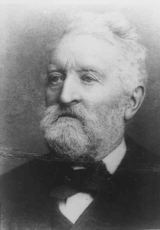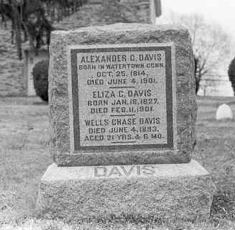|
YANKEE DAVIS
Colonel Lowell's Scout
Contributed by Tom Evans
On the road from Fairfax City to
Aldie, one mile south of Mt. Zion Church, a prosperous farmer named
Alexander G. Davis lived at the start of the Civil War. A native of
Connecticut, Alex Davis did not believe in slavery, but lived with the
fact that many of his neighbors did. However, he was not one to keep
his opinions to himself, and when hostilities began, he found himself
having difficulties. He was forty-seven years of age when his
troubles started with his neighbors, even though his daughter's husband,
Edmund A. Tyler, was serving with the 8th Virginia Regiment, C.S.A.
Turning Point
Court records dated November 12, 1861 state that three
defendants "on the 18th of October, 1861, in the said County,
feloniously and maliciously, in and upon Alexander G. Davis, made an
assault being then armed with dangerous weapons, viz. with guns, pistols,
dirks, knives, etc. and then and there, feloniously and maliciously did
shoot, stab, cut, and wound and cause bodily injury to him..."
This was too much for Davis. He declared this support
for the Union regardless of his family ties. Too old to serve in the
Union Army, he was still an excellent rider and pistol shot, and knew the
area of Northern Virginia very well, had so became a civilian scout who
was assigned to the headquarters of Colonel Charles Russell Lowell.
He was now known as "Yankee" Davis, one of the most hated men
throughout Northern Virginia.
Actively engaged in the pursuit of Colonel Mosby, Davis
helped develop a plan for his capture. Because Mosby was known as
"The Wagon Hunter", several wagons that appeared to be lightly
guarded were loaded with concealed and heavily armed cavalry
troopers. With Davis as the lead driver, they traveled over the
turnpikes and roads where Mosby had been most active. Unfortunately
for the planners, Colonel Mosby was busy elsewhere.
Following the Battle of the Wilderness, Davis led the 2nd
Massachusetts Cavalry south as an escort to the ambulances bringing the
wounded soldiers north to hospitals. As they camped at United States
Ford on the return trip, his favorite, high spirited horse jerked his
picket pin and ran away. It was chased for several miles, but not
recovered, much to Davis' chagrin. He was forced to ride a remount
back to Vienna.
Active in leading the Union Cavalry in pursuit of Mosby's
Rangers, Davis was at headquarters when the disastrous skirmish occurred
near Mt. Zion's Church. Arriving the following day with Colonel
Lowell and the reinforcements, he helped collect the wounded (taking many
to his nearby farm house and barn) and selected the church as the main
hospital. He also took the wounded to the Skinner house and other
nearby farm houses where he knew they would be safe until well enough to
move (when he led an ambulance train to the area to move them to the
Brigade Hospital in Vienna.
Hated by many, Davis was also feared, which helped protect
his family. There was a tacit understanding that families were not
to be involved in the ongoing fighting. Yankee Davis served with distinction, one of the little
known civilians who did his part in preserving the Union.
|
Mrs. Davis' Letter
Yankee Davis' wife experienced some hard times.
He was seldom home, she was asked to tend to wounded "enemy'
cavalrymen, and she had to incur the wrath of her neighbors. The
following letter to her mother provides some insight into the conditions
during the period.
Feb. the (smudged)
Dear Mother, it is a long time since I have seen or heard
anything from you. I sometimes hear from Henry that you are
well. How are you enjoying yourself in old age? I hope that
you are getting along comfortably in these times of War and Calamity
that you know of in the land but you only know war by rumor. I have
lived on the battlefield for the last four years, have seen the dead and
dying all around me, the wounded brought in numbers to die or with
amputated limbs to recover crippled for life.
Just as the all wise Providence would see fir our barn on
one side and the church on the other for as hospitals both have been full
of wounded, dead and dying at the same time. An Army of men encamped
about on every side in every direction as far as the eyes can see -- now
at the present time while I am writing everything is quiet.
But it may be in less than an hour a band of guerrillas or
Squad of Yankees may come in large numbers, perhaps both meet in a few
yards of the house and if they happen to meet a skirmish must ensue and
some wounded and killed. Both horses and men are left on the
side. It has often been the case under my own eyes.
One that died in the barn said when he was dying, Oh, my
poor wife and child. I don't know who he was or where his wife and
child are but his body is buried in a grave with two others just back of
our barn, all three buried without coffins, two more are buried the same
way back of the house so you see I live along on a battlefield with the
Brave and Dead all around me.
Ellen saw eleven all buried in one grave last summer
without coffins. They are buried a little over a mile from here where
they fell. They belonged to Colonel Lowell's Command, fellow soldiers
in the same Reg. with your son and my husband that was in a skirmish with
Mosby's guerillas. Alexander was not our at that time. I have
seen one place in Fairfax where 37 soldiers lie in one grave, Yankee and
Rebel both lie side by side just as their animosity and hatred are over
ant bayonets and sabers laid aside. and they sleep the quiet sleep of
Death that knows no waking. Four soldiers came where the other night
and said they were going to drive off my cows and burn the barn.
They did not care or frighten me much. I am too much accustomed to
such threats. They did not put their threat into
execution.
You would ask if I am not afraid. I was at the
beginning of the War as timid and nervous as most people but know since I
have seen and realize so much of War U have become hardened and almost
fearless - I am not much afraid of anything. I have an
opportunity of seeing and knowing more of War living here on the border
and amongst (?) and guerillas than the soldiers in the field the art and
deception that is practiced. None but an eye witness has an idea.
I have been writing about War. I suppose you would
like to know the health of the family. Ellen has been sick for the
last four weeks. She is better now but not well. Able to be
about the house again. Josie is staying with her. Alexander, I
suppose you here from him nearly as often as I do. The Command he is
with is are stationed at Fairfax Courthouse and now I intend to go down
and see him in a day or so and them I will carry this letter and mail
it. We have no mail here and I seldom hear from any of my relative
in the North.
I have generally found enough to eat in Dixie and learned
to be content as anyone could expect. More so than I would have
believed four years ago. If the War should end perhaps I should see
you once more. I don't know when or where it will end. The
South will hold out four years longer if it can I am satisfied of
that. Jeff will never give up if he can help it so long as he can
find men to fight for him.
From your daughter Eliza
To Mother |
|

|

|
Postwar
Hard times followed the War and much animosity existed in the border
areas. Another former civilian scout for the Union Army, George
Washington "Wash" Fletcher became embroiled in an election
dispute and shot and killed former Mosby Ranger Ernest G. Hunton.
Such incidents probably entered into Yankee Davis' decision to relocate in
Maryland. There he lived a quiet life until his death, shortly after
that of his beloved wife in 1901.
Accident Reported
"Major Alexander G. Davis,
aged eight-five years, a former resident of this county, while attempting
to cross the tracks of the Baltimore and Ohio Railroad at Ridgeville,
Frederick County was struck by the engine of a westbound freight train and
instantly killed. The coroner's jury rendered the verdict that he
came to his death "through the criminal negligence of the Baltimore
and Ohio Railroad Company in not giving the proper warning by blowing the
whistle and ringing the bell of the engine as it approached and passed the
crossing, and by the crossing not being in proper condition." |
Epilogue
In Eliza's letter, her daughter Ellen witnessed eleven of
Colonel Lowell's command being buried in a mass grave at nearby Mt. Zion
Church. Following the War, many contractors were engaged in
collecting the fallen and reburying them in National Cemeteries.
Although this grave at Mt. Zion's Church was commonly known by the local parishioners,
for some reason, it was overlooked. In the mid 1990's, interested
parties made a thorough investigation and identified the eleven troopers
and another who died at a nearby farm (but whose gravesite was
lost). Government tombstones were then furnished and placed in the
cemetery, thus honoring those who gave their lives in the July 6th, 1864
skirmish.
-
William F. Dumareos, Co. K, 2nd Mass Cavalry
-
Owen Fox, Co. H, 2nd Mass Cavalry
-
Samuel C. Hanscom, Co. A, 2nd Mass Cavalry
-
John Johnson, Co. I, 2nd Mass Cavalry
-
James MacDonald, Co. F, 2nd Mass Cavalry
-
Charles Oeidrather, Co. G, 2nd Mass Cavalry
-
Patrick Riordan, Co. I, 2nd Mass Cavalry
-
Charles W. Rollins, Co. I, 2nd Mass Cavalry
-
Cornelious Tobin, Co. I, 2nd Mass Cavalry
-
Michael Hubin , Co. I, 13th NY Cavalry
-
Joseph Lovejoy, Co. K, 13th NY Cavalry
-
Duff Montando, Co. H, 13th NY Cavalry
|
| All referenced material was
obtained from the files of the late John Divine of Leesburg, Virginia. |
|

